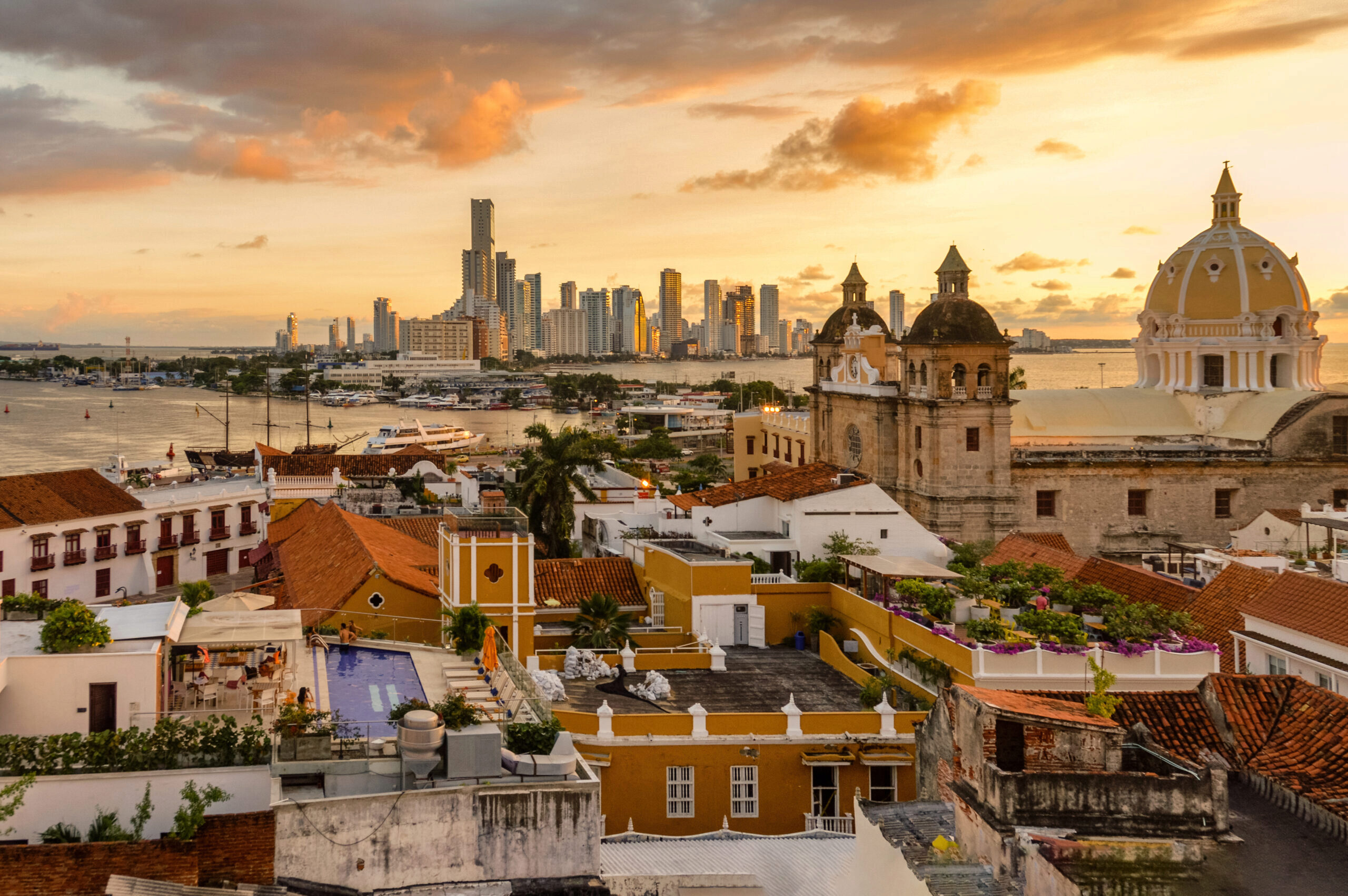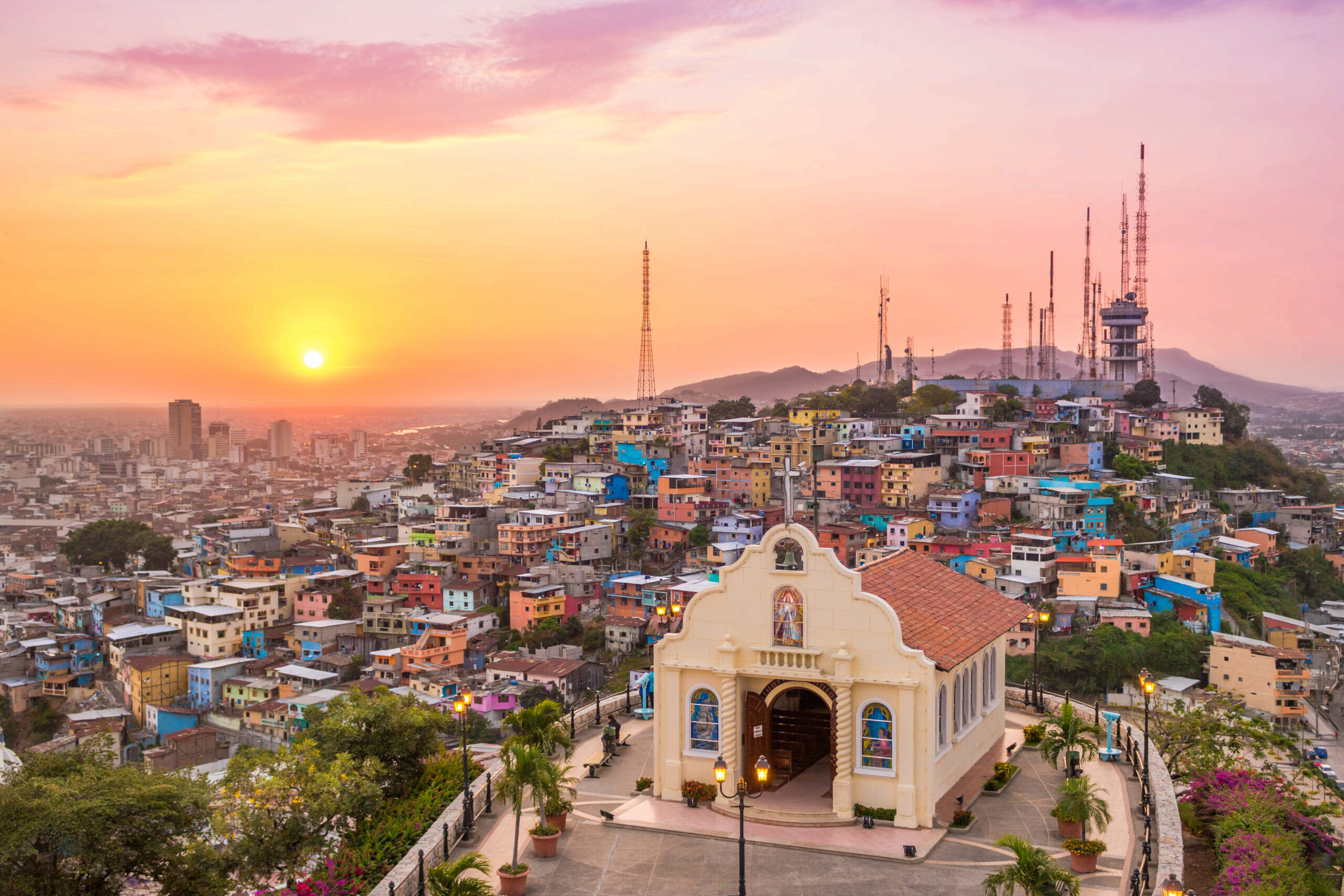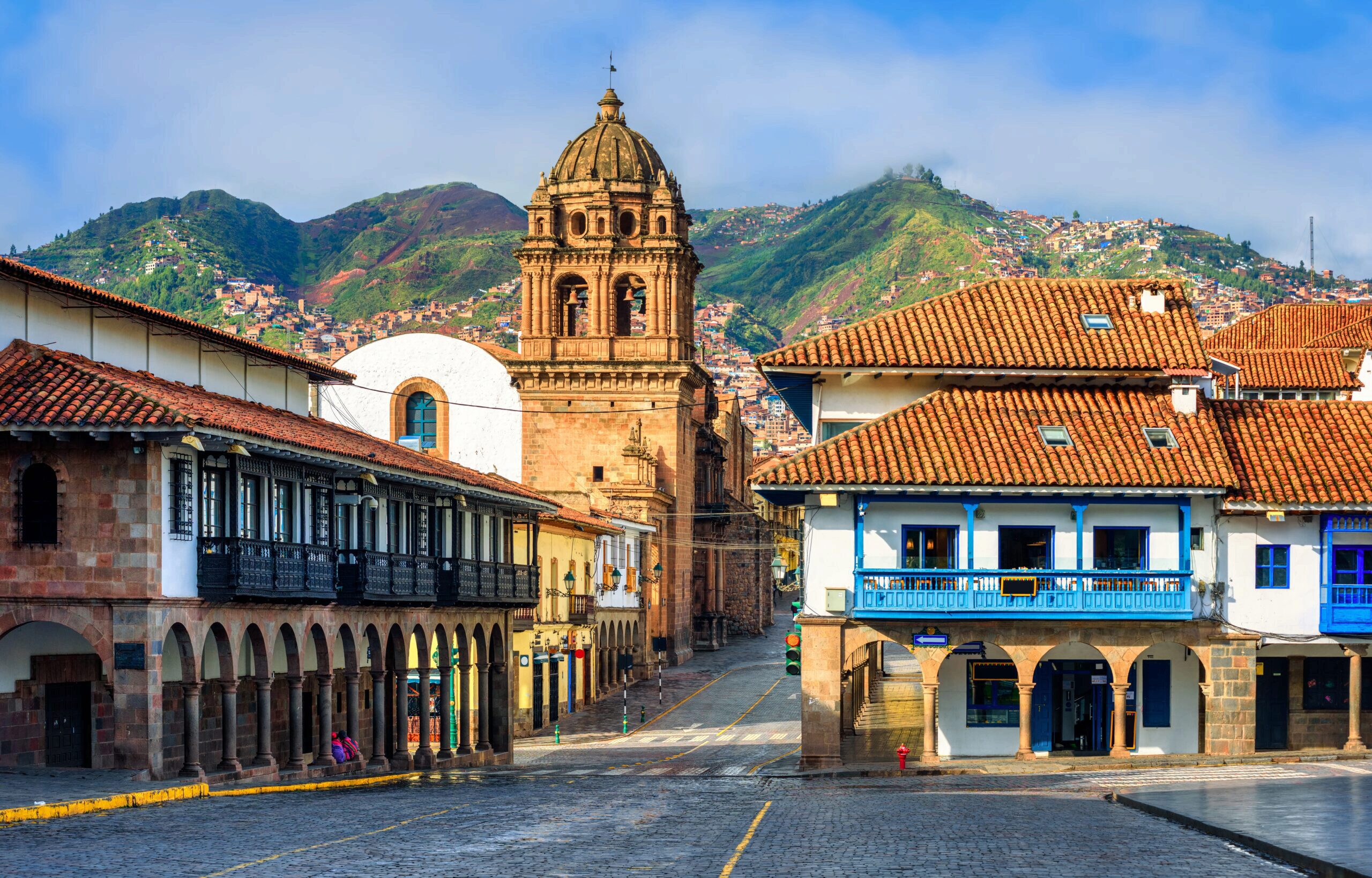The 2023 Zicklin Bright Index
The first edition of the ZBI targeted the 150 highest revenue grossing companies of the Andean Community; Colombia, Ecuador, and Peru in 2021. The Andean Community is a region with significant culture and biodiversity, growing private economic activity, and limited information regarding corporate human rights performance.
Our Region of Focus
The Andes is a mountain range in eastern South America, stretching from Venezuela to Argentina. This region encompasses diverse cultures and biomes, from cloud high altitude tropical forest, to desert arid landscapes. It is marked by political and economic turmoil, with the primary economic activities revolving around agriculture, mining, and oil-related ventures. Politically, the central Andes, including Colombia, Ecuador, and Peru, share a similar identity. They speak the same language, have common indigenous roots, and share a historical narrative, both in their origins and in current events. The three countries have had a similar political tendency, and have fought issues of corruption, organized crime and misgovernance which are risks for the investment in the countries. The shared characteristics create a comparable environment for enterprises, which result in the same practices and industries taking place in the distinct nations.
About the ZBI
Our History
The ZBI is part of a portfolio of rankings dedicated to providing practical, useful, and valuable information about the social impact of private corporations. Through these rankings, we seek to measure company performance and create an improvement market, generating competition with purpose.
Our elder sibling is the CPA-Zicklin Index of Corporate Political Disclosure and Accountability, the only measure of electoral spending transparency and accountability among the country’s largest public corporations. Issued annually, it’s produced by the Center for Political Accountability in conjunction with the Zicklin Center for Governance & Business Ethics at the Wharton School at the University of Pennsylvania.
Based on information posted by companies on their websites, the Index measures performance in three areas: disclosure, company political spending decision-making policies, and board oversight and accountability policies. The raw data used to compile this report is available here.
Objectives
The ZBI stems from the need to identify which companies take human rights seriously, undertake the work of documenting their actions, and make their policies friendly for stakeholders. These are our objectives:
1.
Classify high revenue grossing companies according to their commitment to human rights
2.
Generate a market of companies with a strong awareness of human rights issues
3.
Gain a better understanding of the current status of human rights disclosure by companies globally
4.
Homogenize the standards of business and human rights by region
5.
Systematize best practices
Methodology
The research process started in January 2023 and culminated in September 2023. The investigation focused on five general human rights indicators, divided into 23 sub-indicators that allowed the researchers to understand the companies’ compliance with international standards in depth. Each of the indicators required a general statement, evidence of a policy in place, evidence of verification and practice, and stated consequences of inaction for them to obtain the maximum score.
The factors and indicators used in the ZBI are the brainchild of our dedicated research team. They are tailored to the Andean region and draw inspiration from key international legal instruments, both binding and non-binding. Our measures encapsulate elements from:
1.
Company Selection and Notification
We selected the 50 highest grossing companies from Ecuador, Peru, and Colombia, for a total of 150 companies. Then, in February 2023, we notified the selected companies that we would be checking their publicly available information regarding business and human rights.
2.
Data Collection
Researchers spent between 1 to 3 hours per company gathering publicly available business and human rights data. This spanned governmental records and voluntary disclosures.
3.
Analysis
Researchers analyzed the data and filled a scorecard and a macro sheet with their findings.
4.
Peer Review
In the first round of peer review, each researcher submitted all their results. The 15 companies with the highest scores from each country were then submitted to a second blind peer review.
Results
Our tier system categorizes companies based on their human rights disclosure practices. Tier 1 companies (score: 89-100) exhibit ‘Excellent’ disclosure with transparent, easily navigable reports on Business and Human Rights (BHR), reflecting a strong commitment to BHR issues. Tier 2 companies (score: 80-89) demonstrate ‘Good’ disclosure, maintaining positions on most BHR indicators, with generally accessible information but with notable areas for improvement. Lastly, Tier 3 companies (score: 70-79) are deemed to have ‘Acceptable’ disclosure practices, showing some commitment and information availability, yet are hindered by the difficulty in accessing information or the lack of comprehensive data on key ranking indicators.”
Colombia
Colombia is a country located in South America, bordered by the Caribbean Sea, Venezuela, Brazil, Ecuador, and Peru. Its capital city is Bogotá, which is also the country’s largest city and financial hub. Colombia has a population of around 52 million people, with a gross domestic product (GDP) per capita of 6,104.14 USD.

Tier 1
Chevron: An American multinational energy corporation, predominantly specializing in oil and gas.
Enel: An Italian multinational manufacturer and distributor of electricity and gas.
Coficolombiana: A Colombian company dealing in financial products, with its customers being some of the largest corporations in Colombia.
Tier 2
Reficar: The Cartagena Refinery is an oil refinery in Cartagena, Colombia. It is operated by Refineria de Cartagena S.A., a subsidiary of Ecopetrol.
Bavaria: A Colombian brewery company.
Ecopetrol: Formerly known as Empresa Colombiana de Petróleos S.A. is the largest and primary petroleum company in Colombia.
Samsung: A South Korean multinational major appliance and consumer electronics corporation, headquartered in Yeongtong-gu, Suwon, South Korea.
Sura: An investment management corporation, whose main focus is the financial services industry and holding company of the SURA-Bancolombia Financial Conglomerate.
Telefónica: A Spanish multinational telecommunications company headquartered in Madrid, Spain. It is one of the largest telephone operators, mobile connectivity and fixed broadband services provider worldwide.
Cenit: A Colombian company that provides port, logistics, transportation, and storage services to the oil and gas industry.
Cerrejon: The largest coal mining company in Colombia, with major mines in the Department of la Guajira.
Vanti: A Colombian gas company, engaged in the distribution and sale of natural gas.
Ocensa: The main platform for the transportation of crude oil in Colombia.
Drummond: Colombia’s largest producer of thermal coal.
Tier 3
Exito: A Colombian multinational retail company.
Argos: A Colombian construction materials producer and leader in the cement market in Colombia.
Trafigura Petroleum Colombia: A Colombian company that sources, stores, and supplies petroleum products, including gasoline, diesel, jet fuel, bitumen, and heavy fuel oil.
Essentia: A petrochemical firm in Colombia and resin producer in the Andean region.
Primax Colombia: Fuel trading company.
Promigas: A company dedicated to the transportation and distribution of natural gas, liquefied natural gas, electric power distribution, and integrated services for industry.
Terpel: A Colombian oil and gas company.
EPM – Empresas públicas de Medellín: A Company property of the Municipality of Medellín that operates in the water (and sewerage), electricity, and gas sectors.
Claro: A Mexican company, part of América Móvil, a Mexican telecom group.
Isagen: An energy generation and marketing company. They generate and supply electricity from hydraulic and thermal power.
Jerónimo Martins: A Portuguese corporate group that operates in food distribution and specialized retail.
ISA: An energy generation and commercialization company.
Ecuador
Ecuador is a country located in South America, bordered by Colombia, Perú, and the Pacific Ocean. The Ecuadorian Republic is also composed of the wildlife-rich Galápagos Islands. Its capital city is Quito, while its largest city and financial hub is Guayaquil. Ecuador has a population of around 17.8 million people, with a gross domestic product (GDP) per capita of 5,965.13 USD.

Tier 1
Banco del Pacífico: A state-owned financial institution in Ecuador.
Schlumberger: A French multinational oilfield services.
Cervecería Nacional: A Belgian multinational company, which belongs to the multinational Anheuser-Busch InBev. Its main focus is the production and marketing of soft drinks in Ecuador.
Tier 2
Pronaca: Companies whose operations are related to the manufacturing industry by being engaged in production of human and animal food.
Arca (Coca-Cola): The company produces, distributes, and sells beverages under the Coca-Cola Company brand, as well as snacks under the brands of Bokados in Mexico, Inalecsa in Ecuador, and Wise and Deep River in the U.S.
Nirsa: An Ecuadorian multinational canned tuna company.
Diners Club: An American financial services company, which operates as a private bank in Ecuador.
Banco Guayaquil: An Ecuadorian multinational private bank.
Banco Pichincha: An Ecuadorian multinational private bank.
Tier 3
Holcim: A Swiss multinational company that provides building and construction solutions.
Vitapro Ecuador: A Fishfeed company that is part of the Peruvian multinational group Alicorp.
Telefónica: A Spanish multinational telecommunications company headquartered in Madrid, Spain. It is one of the largest telephone operators, mobile connectivity, and fixed broadband service providers worldwide.
Peru
Peru is a country located in South America, bordered by Ecuador and Colombia. Its capital city is Lima and has a population of around 33.72 million people. Peru has a gross domestic product (GDP) per capita of 6,621.57 USD.

Tier 1
Ferreycorp S.A.A: A Peruvian company that works in key economic sectors of the country, such as mining, construction, energy, and others.
Minera Antamina S.A.: A Peruvian company that produces different ore concentrates, mainly copper and zinc, and others.
Tier 2
Scotiabank Peru S.A.A.: A Peruvian company engaged in financial intermediation operations permitted to multiple banks.
Unión de Cervecerías Peruanas: A Peruvian company and leader in the Peruvian beer market, has 5 decentralized beer production plants all over Peru.
Samsung: A South Korean multinational appliance and consumer electronics corporation, headquartered in Yeongtong-gu, Suwon, South Korea.
Credicorp: A Peruvian financial holding company with universal banking, insurance, and investment banking.
Nexa: A Peruvian mining company of regional scale dedicated to the exploration, extraction, processing, and commercialization of zinc, copper, and lead concentrates with contents of silver and gold.
Enel: A subsidiary of the Enel Group, an Italian multinational company in the energy sector, which participates in the Peruvian market in energy generation.
Repsol: A company founded in Spain that carries out oil exploration activities in the Amazon jungle region, oil refining at La Pampilla Refinery, and distribution and marketing of fuels.
Minsur: A Peruvian mining company that produces tin, gold, niobium, and tantalum. Minsur is one of the world leaders in tin production.
Tier 3
Unacem: A company specializing in the production of cement and clinker of the UNACEM Group, steeped in technological innovation, business growth, talent, and knowledge.
Banco internacional del Peru INTERBANK: A Peruvian bank that is one of the main financial institutions in the country. It is owned by the Intercorp conglomerate.
Inretail Peru Corp: InRetail is a leading Peruvian retail group, that operates and maintains leadership in three business segments: Food Retail, Pharma, and Shopping Centers.
Hubday Peru: A Canadian company engaged in mining, drilling, blasting, hauling, and transportation of ore and/or waste rock, ore processing, and concentrate storage.
Prima AFP: A Peruvian company of pension fund management and the Investment Management Sector.
Ripley Peru: A Peruvian company specializing in the ripley industry.
America Movil Peru SAC: A subsidiary of the Mexican communications company América Móvil, which operates in telecommunications with telephony, internet, and fixed and mobile television services.
Limitations
This is the Beta edition of the ZBI, and as we refine our methodology, we wish to transparently disclose certain limitations:
- Greenwashing: Companies might exaggerate or falsely promote their human rights initiatives, attempting to appear more socially responsible than they genuinely are.
- Reliance on Self-Reported Data: Our research is exclusively based on information provided by the companies themselves. Without on-the-ground verification, the “real” impact of disclosures is not within the scope of this beta version of the ZBI.
- Peer Review Process: The ZBI employs objective and impartial researchers trained to explore the public digital profiles of companies and collect pertinent information about their business and human rights practices. While these findings are subsequently verified by peer researchers, minor variations may occur to inter-rater variance.
- Audit: Although we do not audit companies, the ZBI will move in that direction in the future.
Research Team
Lead Researchers

Víctor Cabezas Albán
Project Director;
Doctor of the Science of Law (c);
University of Pennsylvania Carey Law School

William S. Laufer
Faculty Advisor;
Julian Aresty Endowed Professor of Legal Studies & Business Ethics, Sociology, and Criminology;
Faculty Co-Director, Zicklin Center for Governance and Business Ethics
Research Assistants

Veronica Arias, C’25
Major in Philosophy Politics and Economics (PPE); Minor in Legal Studies and History;
Country of origin: Colombia

Maria Irias Cardenas, W’26
Concentrations in Business Economics and Public Policy (BEPP) and ESG; Minor in International Development;
Country of origin: Mexico

Raymond Liu Ao, C’26
Major in Philosophy Politics and Economics (PPE); Minors in International Development and Sustainability & Environmental Management;
Country of origin: Peru
Past Researchers
Carolina Borja Ortega
Researcher, Ecuador
Francesca Fernandini, WG’24
Researcher, Peru
Andrea Hidalgo Castex
Researcher, Ecuador
Gabriela Jácome Aguirre
Researcher, Ecuador
Mariana Mejía, L’23
Researcher, Colombia
Estefanía Olmos, L’23
Researcher, Colombia
Rafaella Romo-Leroux Chacón
Researcher, Ecuador
Fiorella Ruiz del Campo, L’23
Researcher, Peru
About the Zicklin Center for Governance and Business Ethics
The Zicklin Center for Governance and Business Ethics was established in 1997. The mission of the Center is to sponsor and disseminate leading-edge research on critical topics in business ethics. It provides students, educators, business leaders, and policy makers with research to meet the ethical, governance, and compliance challenges that arise in complex business transactions. The Zicklin Center supports research that examines those organizational incentives and disincentives that promote ethical business practices, along with the firm-level features, processes, and decision making associated with failures of governance, compliance, and integrity.


